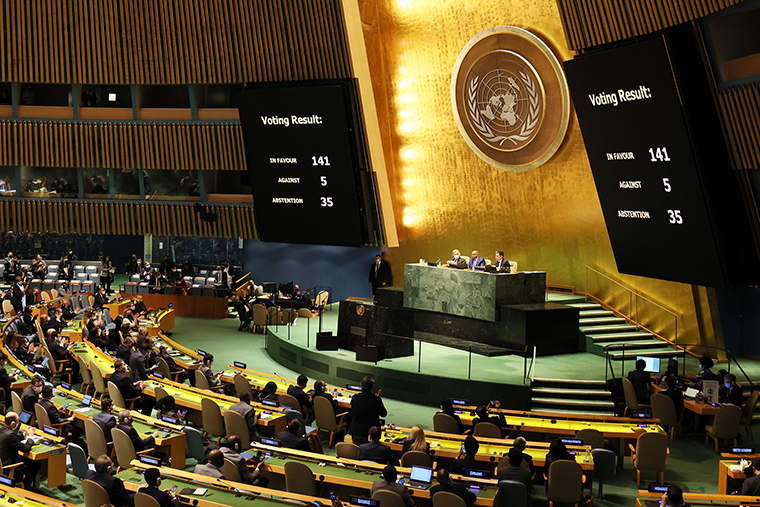
A global crisis: 1 million refugees have fled Ukraine, UN says

As Russia trends closer toward pariah status in many countries worldwide, it appears that it can still count on the support of a small group of countries in the West — Cuba, Nicaragua and Venezuela — and perhaps the burgeoning backing of another central American country.
The latest proof of such support came at Wednesday’s emergency session of the United Nations General Assembly.
Cuba, Nicaragua, El Salvador and Bolivia joined several dozen other countries in abstaining during a vote to condemn Russia’s invasion of Ukraine and to demand Moscow withdraw its troops “immediately, completely and unconditionally.”
While Venezuela could not formally vote at the session because it has not paid its dues to the UN for several years, it almost assuredly would have voted against the resolution or abstained if given the chance.
Venezuelan President Nicolás Maduro spoke by phone with Russian President Vladimir Putin earlier this week and has said multiple times that Putin has his “total support.” After the phone call, Maduro tweeted an old photo of himself and Putin shaking hands, and has blamed the conflict on “destabilizing actions of NATO.”
While the countries did not vote against the resolution, the abstention votes were notable. It meant each country chose not to declare illegal — and immoral — an invasion that the vast majority of the rest of the world agrees is a flagrant violation of international norms and laws.
Cuba and Nicaragua are long-time allies of Russias, with the bond between Cuba and Russia going back decades. Cuba’s government has blamed the current conflict on the United States and NATO’s “increasingly offensive military doctrine that threatens peace.”
Meanwhile, Nicaragua was one of the first countries in the world to formally recognize the Donetsk and Luhansk regions of eastern Ukraine — two pro-Russian areas that Russia formally recognized shortly before it invaded Ukraine.
El Salvador’s abstention was telling, as well, mirroring the silence from the country’s leadership about the conflict since it began.
The country’s president, Nayib Bukele, was extremely vocal in the days leading up to Russia’s invasion, mocking US assertions that an invasion was imminent.
“The boy who cried wolf,” Bukele tweeted on Feb. 18, responding to US President Joe Biden, who said he believed Russia would invade in the next several days.
Since Russia has invaded, however, Bukele has remained silent on the matter.
Meanwhile, Latin America’s heavyweights, including Mexico and Brazil, have drawn fire from critics who have accused the two countries of giving Russia a free pass.
Although both countries’ UN delegations voted in favor to condemn Russian invasion and for a military withdrawal, Mexican President López Obrador and Brazilian President Jair Bolsonaro have stopped short of criticizing Putin or imposing any sanctions.
“We’re not going to take any kind of economic reprisal because we want to have good relations with all the governments in the world,” said López Obrador. “We do not consider that [the war] concerns us, and we think that the best thing is to promote dialogue to achieve peace.”
Bolsonaro, who visited Moscow a few weeks ago, has said that his country was, “not going to take sides.”
“We are going to continue to be neutral and help however possible to find a solution,” said the president currently up for reelection later this year.
Source: https://www.cnn.com/europe/live-news/ukraine-russia-putin-news-03-02-22/h_085a6dc9035cfa03a2ab888e96f58b25

















